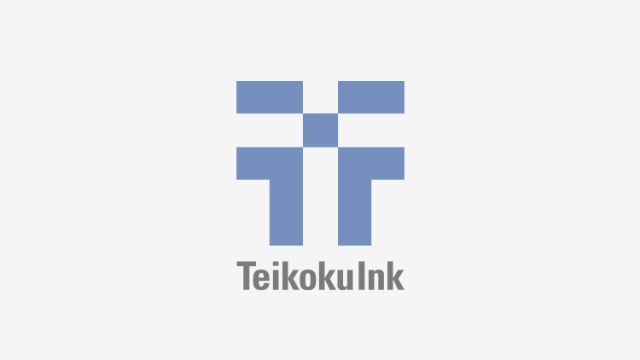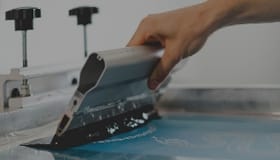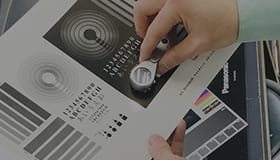Product overview
UV FIL-383 Clear is an UV curable screen printing clear. It is an extremely flexible, highly resistant, super glossy clear with excellent leveling properties. It has outstanding adaptability to flexible materials and can be applied to a wide range of materials, including plastics.
- UV Clear Ink

Application
- Package, Poster, Books, etc.
Features, Function
- Applicable to a wide range of flexible materials. (Good elongation, bending, and cutting)
- Flexible and tough, with excellent curing property and high speed printability.
- Excellent stencil stability, solvent resistance, low odor, and low skin irritation.
- Superior support for offset printing and solvent-based inks, with super gloss and good leveling properties.
Substrate
- Soft and rigid PVC, PVC stickers, PC, Paper, offset printed areas.
- Printed area with solvent screen ink(EG, VG, 13, VK, NAN).
- Printed area with UV curable ink(UV FIL, UF PAL).
- PC
- PVC
- Paper
Dilution
- Not required.
Catalyst, Promoter mixing
- SM-278 DEFOAMER 1% or less(Measures to prevent foaming or repelling)
- SM-301 FLOW AGENT 1% or less(To improve levelling)
Recommended cleaner
- Screen Cleaner L2
Mesh
- T 270 to 420 mesh(Coverage is 60 to 90m2/kg at 350)
Drying, Curing
- Accumulated energy: about 180mJ/cm2, Peak power:225mW/cm2(Eye Graphics UV integral light counter)
- Two 80W/cm Metal halide lamps, lamp height 15 cm, belt speed 15m/min
Caution
- Checking adhesion before production: Adhesion may change depending on the substrates, processes, and printing. Be sure to check the adhesiveness before mass production printing.
- Do not use for printed materials to be placed inside optical disc packages such as CDs and CD-Rs.
- Ink shelf life: 12 months from production date, unopened.
Safety
- UN No.: 3082
- UN Classification: Class 9 Environmentally Hazardous Substances
Handling
- Use safety gloves and eyeglasses to protect skin and eyes. If the ink comes in contact with skin, wash with soap and plenty of water (or lukewarm water) and consult with a doctor.
- Containers should be closed tightly after use and stored in a cool and dark place.
- SDS is available upon request. Please request a copy and read it carefully before handling the products.
Resistance
| Test item | Test Conditions | Test results |
|---|---|---|
| Pencil Hardness | JIS K 5600-5-4 (pencil),Weight 750g, hardness which does not make scar. | 6B or below |
| Heat | 80℃ 72 hrs. leave 1 hr., check appearance and peel off | No defect |
| Hot Water | Soak 72 hrs. in 50℃ hot water, leave 1 hr., check appearance and peel off. | No defect |
| Humidity and cool-heat cycling test | 10 cycles, 80℃ 4 hrs.~25℃ 1 hr.~-20℃ 4 hrs.~25℃ 1 hr. check appearance and peel off | No defect |
| Boiling Water | 98℃ after soak for 5 mi, check appearance and peel off | No defect |
| Water | Soak 240 hrs. in tap water, check appearance and peel off | No defect |
| Acid | Soak 7 hrs. in 5% HCl solution, check appearance | No defect |
| Alkaline | Soak 7 hrs. in 5% NaOH, check appearance | No defect |
| Alcohol | Gakushin scrub tester, cotton soaked ethyl alcohol, weight 500g, 200 back and forth, check peel off | No defect |
| Gasoline | High octane gasoline, weight 500g, 100 back and forth | No defect |
| Solvent | Gakushin scrub tester, cotton soaked ethyl acetate, weight 500g, 10 back and forth, check peel off | No defect |
| Scrub | Gakushin scrub tester, cotton, weight 500g, 1000 back and forth, check color fade | No defect |
| Elongation(%) | Tensilon, 15 mm X 100 mm sheet | 10.0→ 12.5cm |
| Bend | Best tester, condition of no crack in printed ink layer after 180 degree bending. | 2mm or less |
| Punching | Punching by press machine | No defect |
| Blocking | Weight 200g/cm2, 60℃ 100 hrs. | No defect |
| Tensile strength | Tensilon STM tensile tester | 2.4kg |
| Accelerated Weathering | Weather meter, BP temp. 63+/-3℃ Raining rate 18 min/120 min, check color fade and appearance | (400~600 hrs.) No defect |
Test Condition
- Test condition 【80W/cm 2 Metal halide lamps, Height 15 cm, Belt speed 10m/min】 【Substrate: PVC sticker (on VK ink)】 【T 300】
- Above resistance test results are measured results in our laboratory and they are not guaranteed values.
- Information contained in this catalog may change without prior notice.
FAQ
-
What is screen printing?
-
Screen printing is a type of stencil printing which uses a technique of duplicating the image from a design made on mesh stencils.
When printing ink goes through the mesh, it transfers the image onto the substrate material. Other than air and water, any substrate materials are printable. Not only flat surfaces, but also curved, specially shaped, and molded products are suitable for screen printing.

